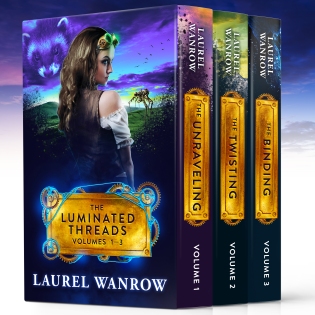 Before kids, Laurel Wanrow studied and worked as a naturalist—someone who leads wildflower walks and answers calls about the snake that wandered into your garage. During a stint of homeschooling, she turned her writing skills to fiction to share her love of the land, magical characters and fantastical settings. Today Laurel answers some questions about digging into history to inspire her steampunk novels and the importance of attending conferences to reach readers.
Before kids, Laurel Wanrow studied and worked as a naturalist—someone who leads wildflower walks and answers calls about the snake that wandered into your garage. During a stint of homeschooling, she turned her writing skills to fiction to share her love of the land, magical characters and fantastical settings. Today Laurel answers some questions about digging into history to inspire her steampunk novels and the importance of attending conferences to reach readers.
The steampunk genre has always fascinated me. What first inspired you to write in this genre?
I have always read fantasy and loved living history. As a teenager, I volunteered for the Appalachian craft center my dad ran at Catoctin Mountain National Park in Maryland. Over the years, I apprenticed to the craftsmen, then after college I worked in historic interpretation for several parks. It wasn’t a far reach to write in a historic time period. I began The Luminated Threads as a strictly fantasy world patterned off of the Victorian period because I’d read several steampunks and really liked the aesthetic. My critique partner said it seemed so like Victorian England that it was annoying that it wasn’t. So I switched it to the Peak District of Derbyshire.
I confess that I’m one of those who will only research when absolutely necessary. It just feels like such a time drain when one’s writing with kids running around. Yet for stories like yours, I imagine research is an extremely important phase of your world-building. Can you share your research process with us, and any tips you have for writers who aren’t accustomed to researching historical periods?
When I say ‘I switched it,’ the process really wasn’t that easy. Having worked as a historic interpreter, I wanted my world to be fairly accurate—fairly because I did take fantasy liberties. Those times were hard, especially for women, but in a fantasy world I could change things like equality and dress. And add magic to equalize the power among genders.
But the research: I questioned and checked everything, including changing the date of The Luminated Threads story—1868—to after steam-powered tractors were invented. Selecting Derby as a location wasn’t random either. It’s the site of the first water-powered silk mill in Britain and many cotton mills followed throughout Derbyshire, making it a center of Industrial Revolution. The borough was also the headquarters of the Midland Railway—and what steampunk doesn’t have steam trains?
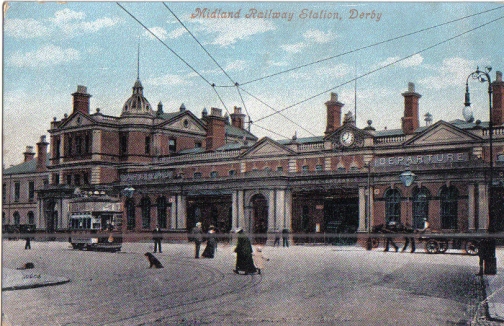
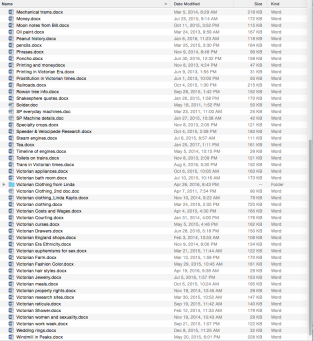 I literally looked up everything. To reference it again, I create folders for background research, and save my referenced docs, with the URLs and often the important passages copied and highlighted. Here’s a screenshot of part of my research files, which reminds me how much I have invested in this series, and that I should really work on the second story arc!
I literally looked up everything. To reference it again, I create folders for background research, and save my referenced docs, with the URLs and often the important passages copied and highlighted. Here’s a screenshot of part of my research files, which reminds me how much I have invested in this series, and that I should really work on the second story arc!
I talked to people who write historic in other time periods, who are reenactors and others who are costume designers. I posted on loops and forums. I read blogs. I read books and took notes. My favorite is What Jane Austen Ate and Charles Dickens Knew by Daniel Pool. It gives general life details, but not every specific a writer needs. But the things I still had to learn are endless: I looked up vegetables planted in England in Victorian times, but referred to a rug as pumpkin-colored for a few drafts until I realized pumpkins didn’t grow in England. Cookies aren’t referred to as cookies in Britain, but I wanted readers to know my heroine wasn’t eating a biscuit-biscuit, so I gave them the name “sweet biscuit” and described them as discs. I gave 1800s “Mason” jar images as a reference to my cover designer, then had a fortuitous moment of doubt and learned Mason jars are American, the British used “Kilmer” jars. But I couldn’t find an 1800s image to verify if the logo was embossed on them. Instead, my cover designer embossed my jars with a “Wellspring Collective 1868” logo on The Twisting, making it my favorite of the three.
You asked about historical research, so I focused on it here, but all of the natural history for the series is researched and as correct as I can make it, too: agricultural crops and local plants I based my shapeshifters on native wildlife, a local mineral called Blue John is a fantasy element. Though my hidden valley doesn’t exist in the Peaks District, other valleys like it have been formed through similar natural phenomena.
One problem I have in writing dialogue for historical characters is their vernacular: what word’s okay for what period, how do they swear, etc. How did you tackle writing accurate dialogue for your time period?
You cannot survive without Online Etymology Dictionary bookmarked: https://www.etymonline.com
Again, I looked up most of the words I use. For example, a character says, “No kidding?” Not in 1868. The colloquial interjection no kidding! “that’s the truth” is from 1914. But to “kid” someone, as to tease playfully, is from 1839.
I know my dialogue isn’t completely accurate, but I tried. You can read historic novels, but other authors make mistakes, too, so honestly, you must double check. Read novels written during the actual time period. I watched You-Tube videos and PBS shows. I asked a British-born friend to beta read and, among many others, he suggested the endearment “Duck” that Mrs. Betsy uses.
Swear words are particularly tricky for historic and YA novels. Some of my information came secondhand from a forum thread on Absolute Write. Many words were reviewed, but most revealing, to me, was that the expletive ‘bloody’ was a highly offensive curse for Victorians. The writer recommended: Holy Sh*t: A Brief History of Swearing by Melissa Mohr, published by Oxford University Press.
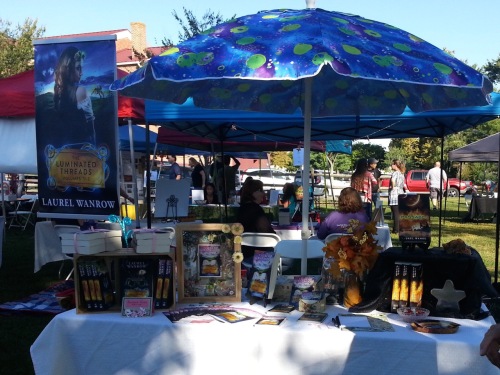
I see you attend conventions and signings. Those in-person events terrify me! Any advice to help a new author like myself get properly prepared for such events?
Attend a few as an attendee and, if you can, with other writer friends. Then you can review what you’ve experienced and learned together. Talk to the authors with tables or on panels to learn about their experience at that con and what other cons or fairs they have attended. Don’t be afraid to ask how it’s going or what they wish they had done differently. Take photos of their table set-ups, ask the sources of materials like display items, banners, table drapes, printed materials. Be sure to look up the event websites. The ‘guest writer/author’ fees, volunteer hour commitments and what equipment (canopy, table, chairs) vary widely. And the application dates are often a year to 6 months ahead of the event! With this information, you can prepare your table or presentations in advance.
When you are ready to attend, it’s fun to go with an author friend or two, having your own tables or sharing one. Coordinate to cover each other for panel talks or breaks, or bring a family member or friend as a helper. Keep in mind the distance to some events adds to your time and cost (hotel stays!); try a few local fairs first to test the waters. I have found that ‘book’ festivals have more book buyers than fantasy cons where costumes and gaming compete with books.
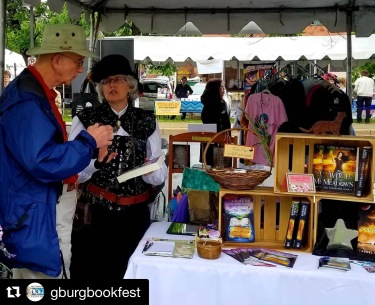 If you have a character in your novel that inspires you to dress in costume, do it. I attract a lot of attention when I wear my steampunk costume.
If you have a character in your novel that inspires you to dress in costume, do it. I attract a lot of attention when I wear my steampunk costume.
Also, watch for sales with printing suppliers to stock up on business cards, postcards, banners, etc. That 40-50% off really helps. Black Friday is coming and that’s a big sale time. Go on the sites early to sift through what you want and even set up your designs.
Any other closing words of encouragement to help your fellow writers through the rough days?
Join a writing chapter so you can develop friendships with those going through the same work, frustrations and joys. Writing is a lonely endeavor and it helps to be able to reach out. I’ve found that having an accountability partner helps—one in similar circumstances to yourself (i.e. writes full time, works fulltime/writes on weekends, writing around toddler schedule) is best.
Thank you so much for your time!
 About the Author
About the Author
Laurel is the author of The Luminated Threads series, a Victorian historical fantasy mixing witches, shapeshifters and a sweet romance in a secret corner of England, and The Windborne, a lighthearted YA fantasy series that begins with The Witch of the Meadows.
When not living in her fantasy worlds, Laurel camps, hunts fossils, and argues with her husband and two new adult kids over whose turn it is to clean house. Though they live on the East Coast, a cherished family cabin in the Colorado Rockies holds Laurel’s heart.
Visit her online and sign up for her new-release newsletter at www.laurelwanrow.com.
Thanks so much for sharing your experience, Laurel! I hope everyone checks out your work.
I’d also like to invite everyone to add my free fiction on this site. All you need to do is subscribe to my monthly newsletter for the password.
Read on, share on, and write on, my friends!
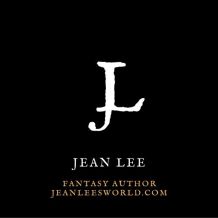

So cool! Now I want to read the history of swearing book!
How does Laurel’s research method compare to your own?
Sent from my iPad
>
LikeLiked by 1 person
I know, right? Gotta see if the library has that.
I guess you could say I google as I go. Sometimes I get books to study, but mainly for pictures so I don’t have to read….seriously, my latest short story with the hot air balloon pilot–i’m just all “show me pictures of old balloons, you books! Where’s a picture of fuel? WHERE’S A PICTURE?!?!?!”
This, mind you, is coming from a composition teacher who teaches students the importance of critical reading and research.
I seep irony. 😉 xxxxxxxxxxxx
LikeLike
I’m Gen-X. Irony is my last refuge against a mad world.
LikeLiked by 1 person
Ha! I’m Generation Y.
…
I have no clue what that means, but that’s what I am. 🙂
LikeLike
I like your comment—’I guess you could say I google as I go.’ Me too.
LikeLiked by 1 person
Laurel’s actually inspired me to do a little field research. Stay tuned for next week’s post to take place from my kitchen…or the remains of my house, depending on how things go. 😉
LikeLiked by 1 person
Pingback: #Author #Interviews: #Writer Laurel Wanrow Discusses Attending #Conventions & #Researching #History for #Worldbuilding & #Dialogue — Jean Lee’s World – Earth Balm Creative
Great interview! I especially liked your question about writing accurate dialogue for a time period – as a reader, that’s one of my pet peeves when I’m reading something that takes place 400 years ago and a character says something like “hey you guys!” I also love the advice Laurel Wanrow gives regarding getting prepare for author events. Good luck Jean Lee!
LikeLiked by 2 people
Thank you so much! Yes, I concur about the dialogue. I enjoy informal personal chatter as much as the next reader, but not all modern slang/terminology translates no matter what writer’s using them.
…Oh my gosh I didn’t tell you! I shared one of your articles in my first newsletter. I enjoyed it so much I just had to share! 🙂
https://mailchi.mp/de6ed28a127f/from-the-wilds-of-jean-lees-world-september-2018-edition
LikeLiked by 1 person
Well, thank you for the mention! (Now, I’m subscribed to your newsletter).
LikeLiked by 1 person
Huzzah, and thank you for sharing such fantastic interviews!
LikeLiked by 1 person
She is an incredibly hard-working and devoted writer. Very amazing and admirable. Puts someone I know (i.e. me) to shame.
LikeLiked by 1 person
You and me both. Whatever notes I had are shoved into books or piled into a single long indecipherable Word document. 😦
LikeLiked by 1 person
Some great advice here. I’m particularly impressed by Laurel’s file system. I’m still strongly attached to backs of envelopes, and periodically stumble across hastily scribbled quotes and ideas in old notebooks I thought I’d finished with. Any time I start congratulating myself on having entered the digital age, I check out the heap of notes still waiting to be transcribed and wonder if I’ll ever get there.
And here you go, adding to that jumble of papers by providing me with another author to add to my ‘wanted’ list. Good job Christmas is approaching.
LikeLiked by 1 person
Yes, I use that scribble system all the time! There’s no less than 3 notes in my kitchen alone. Really should move those before they get smeared by peanut butter…
Happy to help add to the TBR list! 🙂
LikeLiked by 1 person
Gracious Jean, my net must not have been connected when I liked and left a message to say…great post . Happened twice these last few days xxxxxx
LikeLiked by 1 person
Bugger! I know the feeling–for some reason the Internet keeps cutting out on the new desktop, so I find myself depending more and more on Dad’s old computer, which beeps angrily at times and likes to overheat. Ugh.
LikeLiked by 1 person
Fed up. Happens all the time. xxx
LikeLiked by 1 person
Pingback: #writers, when good #storytelling requires #fieldresearch, you better be prepared. | Jean Lee's World
I am so impressed with the thoroughness of your research, your thinking about the book, and your willingness to modify and adjust it,
LikeLiked by 2 people
Thanks so much for your thoughts! I know, Laurel is AMAZING. 🙂
LikeLike
Pingback: Laurel Wanrow | Travel and an Interview